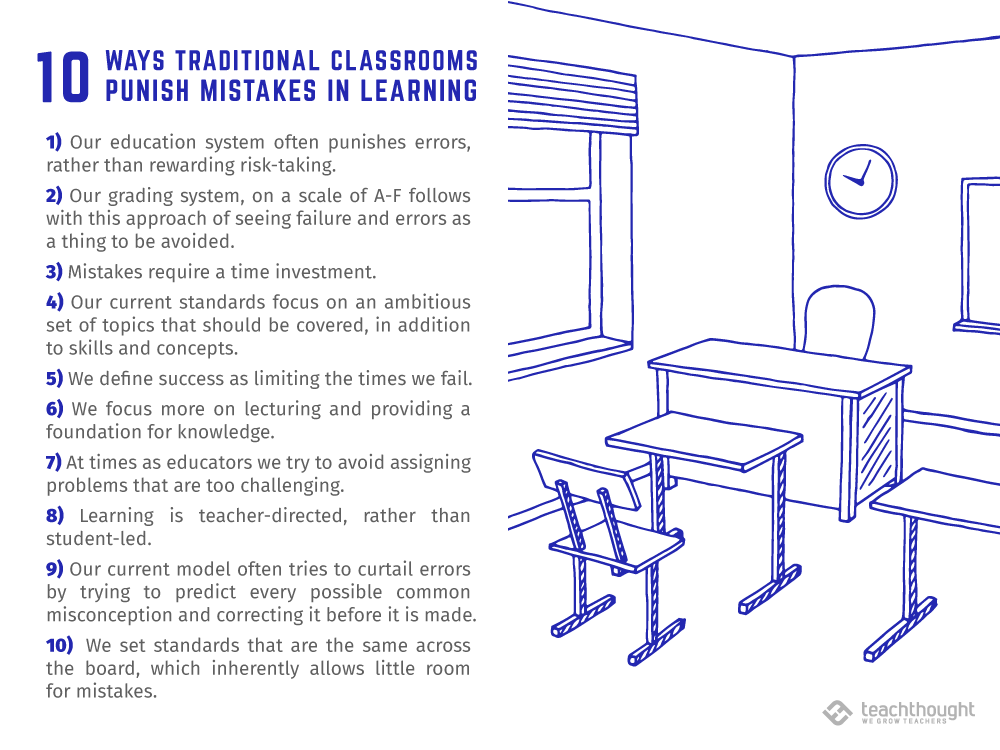10 Ways Traditional Classrooms Punish Mistakes In Learning
By using uniform standards and assessment forms, our education system often punishes errors, rather than rewarding risk-taking.

10 Ways Traditional Classrooms Punish Mistakes In Learning
contributed by Miriam Clifford
The greatest mistake I ever made in my education was failing a physics course at Cornell.
I opted to take an auto-tutorial class that did not require calculus because I was afraid to make math errors. Up until this point, I had never failed at anything. It was a turning point for me. I had to dispel prior notions of learning to succeed. I accepted that there would be many errors along the way. I relearned the basics I had previously memorized through difficult examples and repeated detailed lab work.
On a broader scale, changing the way we see errors–as natural by-products of the learning process rather than time-costing falters to be avoided–can help us produce better learning outcomes in education.
10 Ways Traditional Classrooms Punish Mistakes In Learning
1. Our education system often punishes errors, rather than rewarding risk-taking.
Schools were modeled in the Industrial Revolution to be efficient and reduce time spent on divergent thinking. After all, in a factory environment, divergent thinking might break down a process or the status quo. In today’s global technology-based economy, we often want students to do the opposite-to find a way of improving a process or a way of seeing things differently.
2. Our grading system, on a scale of A-F follows with this approach of seeing failure and errors as a thing to be avoided.
In some cases, perhaps failure is just that, a lack of understanding that needs to be corrected or lack of preparation. But mistakes on the way to mastery can be valuable learning opportunities. They solidify learning connections.
3. Mistakes require a time investment.
We can teach the entire textbook, but if students can not apply knowledge to solve problems it is meaningless. We may want to focus less time on covering the entire scope of knowledge, and rather focus on real mastery. As the saying goes, learning that is mile wide, inch deep is not very useful.
A student can go back and fill in the different topics if their understanding of a topic is deep enough to solve problems. Application of knowledge is more important than acquiring additional superficial knowledge-which is easy in today’s day and age with technology.
4. Our current standards focus on an ambitious set of topics that should be covered, in addition to skills and concepts.
If we only focused on skills, teachers would have more time to go deeper into subject areas and allow students enough time to achieve mastery. Sometimes, teachers are racing against the calendar to make sure all required topics are covered by the end of the year. Less specific standards on a continuum might be more beneficial, rather than rigid requirements.
5. We define success as limiting the times we fail.
Instead of focusing on complexity and mastery, we measure success as the number of times we avoiding making mistakes. On many exams, we are choosing the correct answer, rather than demonstrating we can solve a complex problem.
We try to reduce the time spend on trial and error. We don’t think students will clearly understand a topic if they make errors. A better way would be to consider what errors students are making and why, then prioritize accordingly. Exams can focus on building information, rather than regurgitating it.
6. We focus more on lecturing and providing a foundation for knowledge.
Lecturing can afford students with a basic understanding of a field, but when solving problems trial and error is necessary. For example, most homework is a problem set, or application of a lecture.
7. At times as educators we try to avoid assigning problems that are too challenging. We may not allow opportunities for blunders to occur. We are afraid that making too many mistakes might confuse students, but when we lose sight of mistakes, we may be missing exceptional learning opportunities.
8. Learning is teacher-directed, rather than student-led.
In the old model, learning often focuses on listening to the teacher lecture and then applying knowledge to specific situations. We might want to consider reversing the order of traditional learning: presenting a problem first and then letting students learn how to solve it.
This type of reversed learning scenario allows opportunities for growth through trial and error.
9. Our current model often tries to curtail errors by trying to predict every possible common misconception and correcting it before it is made.
10. We set standards that are the same across the board, which inherently allows little room for mistakes.
This post has been updated from a previous post; 10 Ways Traditional Classrooms Punish Mistakes In Learning
